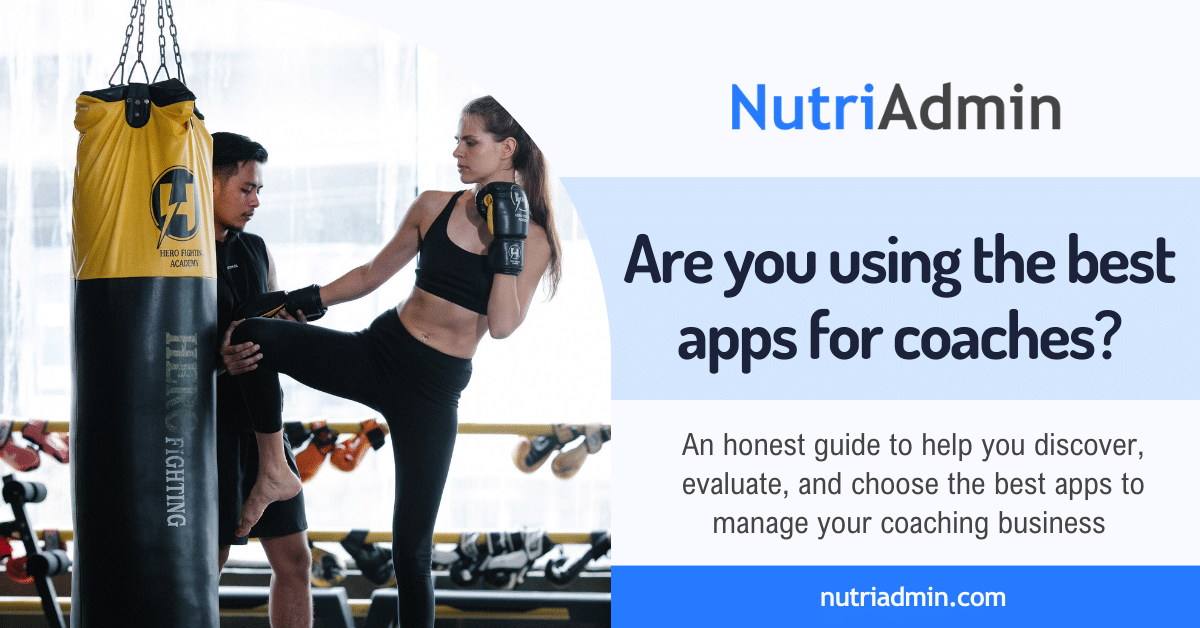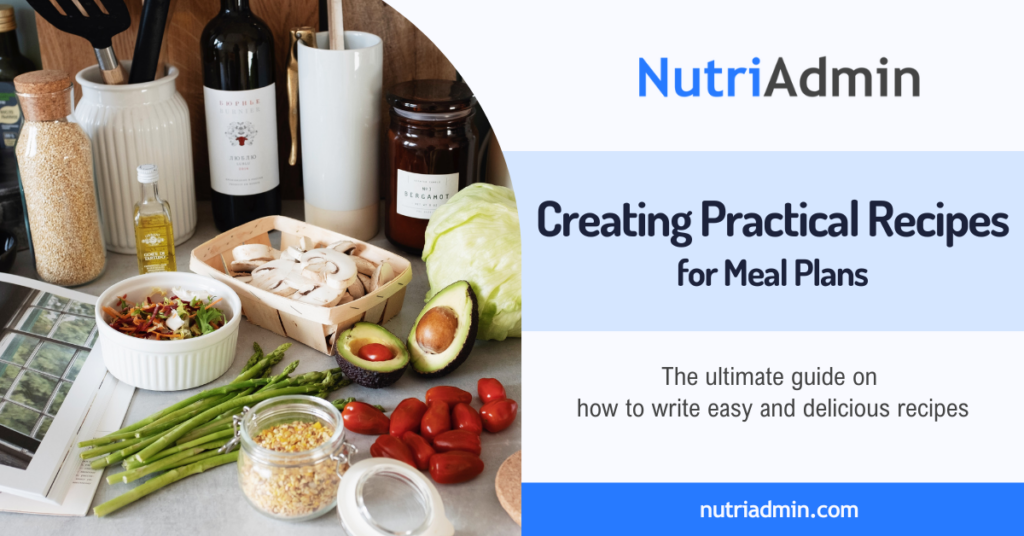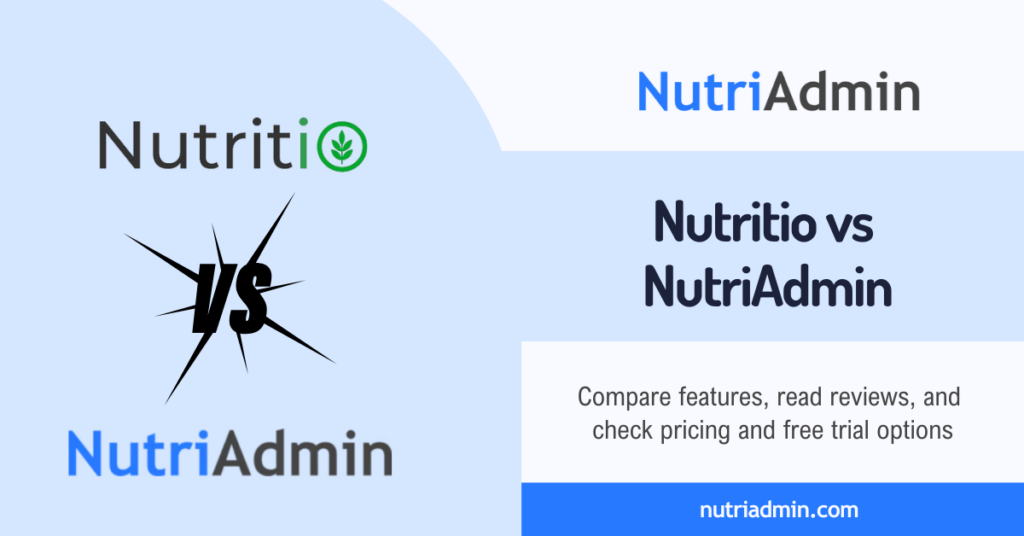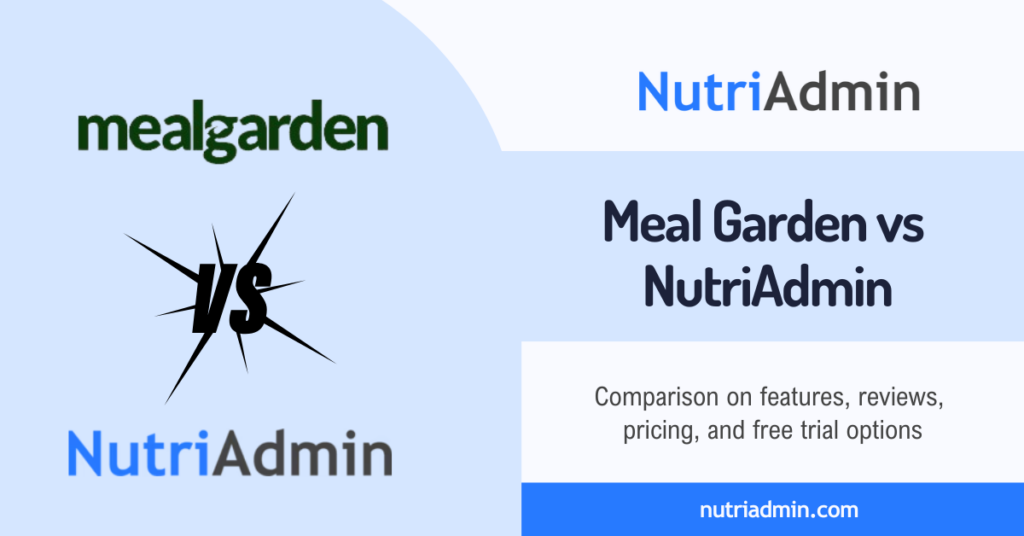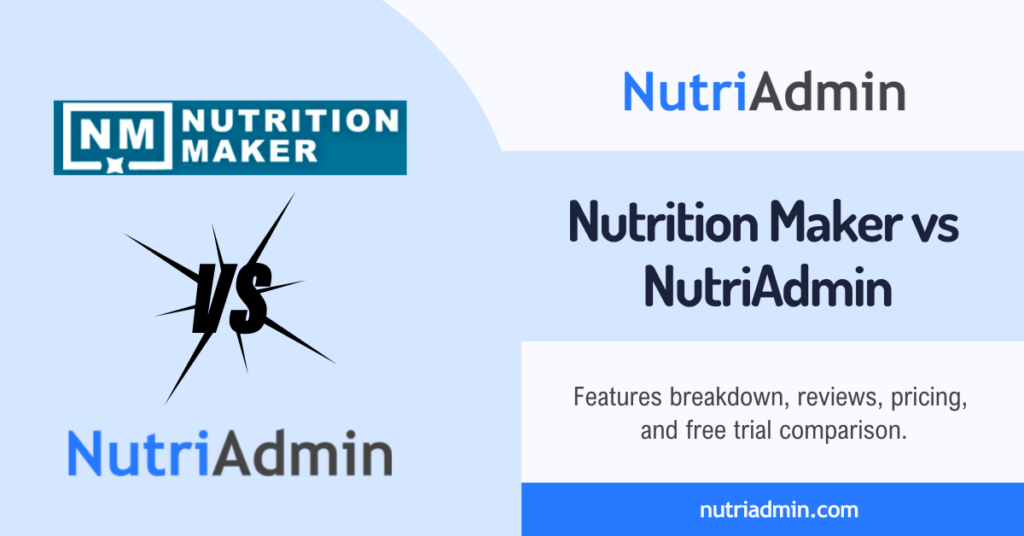In the fast-paced world of health and fitness coaching, staying ahead of the curve is a necessity. As a coach, your goal is to inspire, guide, and elevate the performance and well-being of your clients. A critical part of your work is choosing the right tools. In particular, you need the best apps for coaches – that align with your unique coaching style and client needs. The same applies if you are a personal trainer. Finding the best apps for personal trainers is crucial too. The advice in this guide applies both to coaches and PTs looking to up their game.
The above being said, the sheer volume of available options is overwhelming. I get it. It can be challenging to discern which app, or combination of apps, will best work for you.
Have you ever found yourself pondering which app will best streamline your scheduling? Or which one will make tracking your clients‘ fitness progress easy? Do you need workout planning? What about nutritional guidance? or Mental wellness strategies? All of this of course for a reasonable price. Many people will tell you their app is best. However, who can you trust when it comes to apps for coaches?
In this deep dive article, I present to you an honest and thorough guide to help you out. After reading, you will know how to find the best apps for personal trainers in the health and fitness domain. This article is related to our best meal planning app and best apps for nutritionists guide.
I understand that each coaching journey is unique. A tool that works wonders for one might not resonate with another. That’s why this is not a one size fits all ranking. There is no single best app. Rather, my aim is to equip you with the tools to make the right decision for yourself. After all, diverse readers may stumble upon this article, and I cannot presume in advance what you will need.
So, are you ready to uncover the app or combination of apps that will revolutionize your coaching experience? Are you prepared to discover tools that resonate with your coaching philosophy and amplify your impact? Let’s embark on this journey together, exploring the digital landscape to find the perfect tech ally for your coaching career. Continue scrolling to unravel the world of possibilities that await you in the realm of health and fitness coaching apps.
- The 1 minute article summary
- Who is this guide for?
- Why is this not a ranking on the best apps for coaches?
- Why trust me on which apps for coaches and personal trainers are best?
- The information apps for coaches don't want you to know
- Why companies don't tell you the full story
- How is the typical buying experience of a coach at NutriAdmin?
- Cancellation feedback insights
- Does size matter? Niching and differentiation
- How to find trustworthy reviews on the best apps for coaches
- How to evaluate reviews for competing apps for coaches?
- Biased vs unbiased information
- How to choose the best apps for coaches and personal trainers
- Free resources to help you choose the best apps as a coach
- So what are the best apps for personal trainers and coaches?
- Frequently Asked Questions
The 1 minute article summary
If you just want the answer, here it is. You should check reviews in Capterra. Then, try 5-8 of the best looking apps for coaches for yourself. Evaluate the app as well as the customer support using free trials. Once you have done that, you will be able to make an informed decision.
The above is the summary, but obviously there is more to it than that. How do I find trustworthy sources of advice? Can reviews be trusted? How to factor in cost? What about integrations and the long-term?
The guide will go in-depth and answer everything you need to know in-depth.
Who is this guide for?
This guide is made for coaches who work in sports, fitness, health, and wellness. It is also for personal trainers. If you’re one of these coaches, your job is more than just teaching exercises or giving health tips. It’s about helping people in a complete way, making sure they stay motivated and see real results. This guide is perfect for you if your daily work involves:
- Setting up meetings with clients
- Talking to clients often
- Keeping track of exercise for clients
- Tracking fitness and health goals with clients over time
- Ensuring clients stay motivated over time
- Making meal plans
- And anything else related to sports, fitness, health, and wellness coaching
Throughout this article I will use the terms coach/personal trainer interchangeably. This is because the method for finding the best apps for personal trainers is pretty much the same as for a coach. Many personal trainers consider themselves coaches, and vice versa.
If you spend a lot of time doing any of the above, then this guide is here to help. It’s designed for coaches like you. Whether you are a team coach, a personal trainer, a health advisor, or someone who helps people live healthier lives. I want to show you the best apps that make these tasks easier. After all, you want to focus more on coaching and inspiring your clients and less on admin. This guide will help you choose the right apps to help you achieve your professional goals.
Why is this not a ranking on the best apps for coaches?
Were you expecting a ranking? Something like “Top 10 apps for personal trainers”? Or a ranking on the best software for personal trainers? If that’s the case, I’m afraid you won’t find that in this article. That’s because there is no single app that is best for every coach. It all depends on your goals, style of work, budget, client volume, and a myriad other factors.

The above being said, some apps are better than others for certain aspects of your work. Not only that, some apps offer key features others don’t. There is likely an app or combination of them that will be the best for your individual situation. The goal of this article is to equip you with knowledge so that you can make an informed decision. Once you read the article you will be able to find the best apps for personal trainers for your situation.
The secret marketers don’t want you to know
Why do I mention rankings though? If you google “best <insert product category here>” for pretty much anything, you will find loads of articles showing you a list or ranking of the best apps (or products) in any given space. Why is this the case? This is simply human psychology. We love comparisons and we want to make the best purchase when we are shopping for a product.
As a matter of fact, marketers and copywriters know this. They know that some of the most commonly searched terms related to any product are rankings, reviews, and comparisons. This is the first thing most consumers will search online when thinking about a purchase. It may actually be the way you yourself landed on this article.
Rankings are popular but have big limitations
For anyone out there working in marketing, writing short articles with lists and rankings of apps is a quick win. Those articles will get clicks and traffic. If the page is serving ads, then that page will bring profits to the company. Safe to say, you won’t find any ads in this article – that is not our goal. Our goal is to educate you so that you can find the best app that works for you.
Being honest, how useful have you found rankings of “the best apps for coaches” or “best apps for personal trainers” in the past? I mean, these rankings can serve as a starting point, hopefully showing you some decent apps. However, the analysis will usually be superficial. After all, there are coaches of all types, working online and offline. Your focus may be on health, fitness, nutrition, mindset, even finance or business! Clearly there can’t be a single app that is at the top of the ranking for everyone!
Rankings work for simple scenarios with objective data
A ranking can be useful for simple scenarios that have a clear winner. For example, you can find a fairly objective ranking on the largest economies in the world by GDP. This is an objective measure. However, the concept of a ranking breaks down when it comes to subjective topics like a tool for work.
So, taking the above into account, I am here to teach you rather than to tell you. I will be presenting you with everything I know about apps for personal trainers/apps for coaches. My goal is to equip you with knowledge you may not have. This will allow you to pick the app that best suits your individual needs.
Why taking the time to research apps for personal trainers or coaches is worth it
This is, purposely, a long, in-depth article. You don’t have to read the whole thing, and you can skip to the sections that are relevant. The point I want to make though is this: you should take your time choosing the best software for coaches. It’s best to take some time to sample some options before committing prematurely to one. Don’t be impatient, your future self will thank you.
Have you heard of the “Secretary Problem”? It’s a concept from mathematics that helps us make decisions amongst many options. I.e. just like a coach choosing the best apps from a variety of choices.
Let’s assume you are a coach looking for the perfect app to assist in training. There are dozens out there, each with unique features. You want to pick the best one but can’t try them all for an extended period.
Here’s where the Secretary Problem comes in. It suggests that you should quickly review a certain number of apps without making a final decision. In practical terms, it should be around 5-8 apps. This initial phase is for getting a feel of what’s available. The goal is understanding average quality and features. After this exploration phase, you should pick the best app.
The secretary problem is universal
This problem isn’t just about apps; it’s universal. It applies to many real-life situations, like finding a job or picking a flat to rent or buy. In each scenario, you have a series of options presented one after the other. Then, you must decide without knowing what future options might be available. The Secretary Problem teaches us a structured way of balancing exploration and decision-making. The goal is to ensure that we make a well-informed choice without getting lost in endless searching.
Of course, this is a simplified theoretical framework. In real life, you can go back and pick your favorite app amongst the ones you have tried. You can also switch to another app in the future if you find something better than your current system. Nevertheless, the fact stands that most people don’t try enough options. The reason for this is simply because it takes time and it’s tedious. However, the fact is that some apps can help you much more than others in the long-run. Consequently, I’d argue it’s a great investment to dedicate some time to informing yourself before committing to any given app.
Why trust me on which apps for coaches and personal trainers are best?
Whenever you consider online reviews or comparisons – especially when they relate to commercial products – the first question to ask should be why should I trust this source? After all, when someone is trying to sell you something they have a vested interest. You cannot simply take biased information at face value.

In this section I will try to earn your trust. Essentially, I will be presenting the case on why listening to me could be worth it. Please check the following points below and consider if they seem reasonable to you. This will take a few minutes of your time. After that, you will be able to decide whether reading this article is worth your time.
What do you have to gain? Well, if you find the advice in this article useful, and it leads you to pick the right apps for your coaching career, then you could enjoy some of the following benefits:
- Saving time in repetitive tasks and admin work
- Growing your business and expanding your income
- Allowing for more personal client interactions more often
- Keeping organized
- Enabling you to provide extra services, like meal plans or workout plans
- Being more efficient
- Freeing up time to spend in calls or client sessions
Who are we and what do we know about apps for coaches
My name is Diego. I am a senior software developer and I have been running NutriAdmin since 2016. We primarily sell software for nutritionists, although personal trainers and coaches also use our software.
Now, let’s address the elephant in the room. Why should you listen to me? After all, I am biased, since I sell an app myself. You may be thinking that my goal is just to promote my own software.
Actually, I am here to argue something a bit more nuanced. You may think I would love it if every coach signed up for my own app. However, the truth is that this only makes sense when the app is the right fit for the coach. Our business doesn’t really benefit when the wrong type of professional signs up. After being in the business for over 7 years I have seen that everybody is unique. Each coach uses different features and has different needs. There is no one size fits all solution. Let me elaborate.
How an app for coaches makes money
NutriAdmin operates as a software as a service (SaaS) business. This means that users (i.e. nutritionists or coaches) pay a monthly or annual fee to use the software online.
Why is this relevant? Because an app like our, only really makes money when the users are happy for the long term. It’s the same for any other competing SaaS product out there. This shouldn’t come as a surprise, as it is the same for coaching too. Have you ever met an overexcited client that joins for one session, cannot stop raving about how amazing your coaching is, how they are going to turn their life around… then you never hear back from them after the initial session?
It’s the same for software. Any software company has clients that try it once and never come back. There are also users that sign up and pay for a single month then ask for a refund. None of these short-term users bring any significant revenue to the makers of an app for coaches.
It’s all about providing value for the long-term
On the other hand, there are the loyal customers that stay with the app for years and years. This is because they are clearly deriving a lot of value from the service. These users represent perhaps 90-95% of the income an app like NutriAdmin makes. I would guess it’s the same for any other subscription-based service.
In NutriAdmin, some of our best customers have paid over the years over 100 times the typical monthly rate. Others have canceled, never having paid a dollar. This is a critical consideration when choosing software as a coach. That is because this shows you that choosing the right app is crucial. You may find something that works for you for a decade, whilst other choices won’t work at all for you.
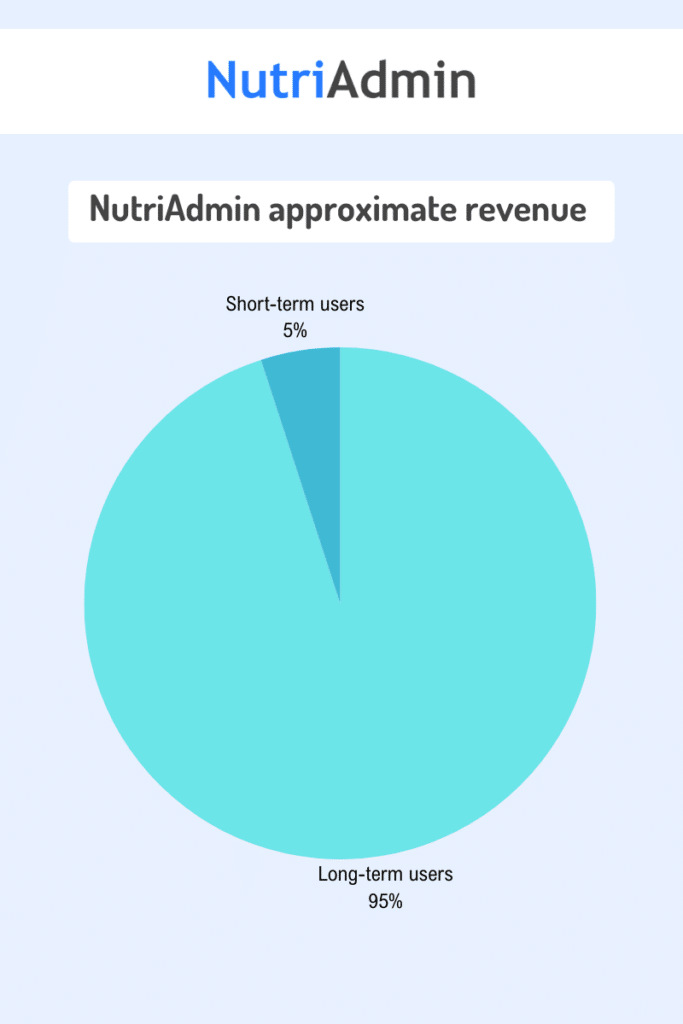
In purely financial terms, every time a bad fit customer signs up we lose money. Admittedly it’s a small amount, but it all counts. We lose money because it costs time to answer new user questions. It costs money to run servers. It costs money to process refunds. It’s the same in your case as a coach. When someone does a free onboarding call with you but never signs up you lose time. It’s all about getting the right customers for the right product. This is common amongst many types of businesses.
How customer buying patterns have changed over the years
Before the internet, business often relied on consumer ignorance. Buyers didn’t have the facts and were not equipped with the right knowledge to make an informed buying decision. The archetypal situation of the old days would be buying a second hand car. In this scenario, the salesperson would know which cars would be decent, and which would be likely to break.
These days, with the internet, the average consumer researches dozens of sites before making a purchase. You can know everything there is to know about a product before buying. This is thanks to reviews, friend recommendations, guides online, etc.
Basically, there is no point in hiding information from buyers. As a company, even if you “trick” someone into buying something that is the wrong fit for them, they will quickly cancel the service, ask for a refund, and be disgruntled. Companies still doing this are losing market share every day.
Ensuring the right customer-product fit
So essentially, it is in the interest of an app provider to show you all the facts. My goal is to make sure you make an informed decision. After all, what is the use in wasting marketing dollars on customers we won’t be able to keep? There are hundreds of apps out there, with different focus and features. Statistically, I can only expect NutriAdmin will be the best fit for a fraction of readers.
When you choose the right app (or apps) it will be obvious. You will feel how the app developers have thought about everything you need.
On the other hand, when you pick the wrong app, you will notice that key features are missing. An app that is not a perfect fit will have some features that are OK but not great. It’s like trying on some shoes that are two sizes too big. Hence the importance of comparing apps, checking reviews, doing free trials, and ultimately selecting the best.
This principle applies broadly, e.g. the is the keto diet effective for weight loss? The answer is: it depends. It works great for some, and doesn’t for others. Can you lose weight on the vegan diet? Same story.
Some diets polarize people, with lovers and haters. Same goes for apps for a variety of reasons.
Who to listen to when it comes to apps for coaches or apps for personal trainers
If you have worked as a coach for a while, you will have access to multiple sources of advice. These include: colleagues (other coaches), experts/influencers in your field, and your school/training program. All of these can constitute excellent sources of advice on how to choose the best apps for personal trainers/coaches. They all have their pros and cons.
On the other hand, someone like me has years of experience developing software. In particular, software for the nutrition, coaching, and wellness industry. Someone like me can provide a fresh perspective – from a different angle – on choosing apps for work. My experience comes from a different background. This means you can complement your coaching knowledge with software insights.
Let’s break down the different sources you can consult for advice and recommendations. They can all help you choose the best software for your coaching business. Moreover, they all have their pros and cons.
Comparing sources of advice on apps for coaching
You can get advice from a variety of sources when it comes to which apps are best. Here is the breakdown:
- Other coaches
- Reviews
- Influencers/experts
- Schools/Training programs
- Companies providing apps for coaches and personal trainers
Below are tables with the pros and cons of each source of advice. Consider them carefully as not all sources of advice are the same.
Advice from other coaches
The easiest is probably to ask a friend or colleague, what apps for coaches do you use? Below are the pros and cons of getting recommendations this way.
| PROS | CONS |
|---|---|
| Personal opinions of other professional coaches can be valuable if they have a similar coaching style and business to yours. The more closely other coaches resemble the way you work, the more valuable the advice. Ideally, you would seek the advice of someone in your same country, providing a similar range of services. If possible, your role model should be a few years ahead of you in their career. | Personal opinions may be unreliable. Never base your whole decision on a single opinion. After all, what if the other coach’s experience does not map to yours? |
| Unbiased, as other coaches don’t have a stake in promoting specific apps. This is, of course, unless they may some sort of affiliate commission on selling specific products. | A single data-point can be misleading, after all there are all sorts of personal reasons why people like or dislike products. A way to counter this is to read reviews that aggregate the opinions and experiences of multiple professionals in one. This being said, it can be hard to know which of the reviews come from coaches whose work resembles your own. |
App Reviews from other coaches
The table below breaks down the pros and cons of getting advice from reviews by coaches.
| PROS | CONS |
|---|---|
| Reviews aggregate the feedback of a lot of users. This means you can get a sense for the typical experience by checking the average rating of an app. | Some of the coaches or users providing reviews may have completely different needs to your own. E.g. if you don’t do in-person coaching and you only work online, reviews complaining about the in-person features will be irrelevant and distort the data. |
| If there are any 1-star reviews you can learn what can go wrong with an app. You can then decide whether that is something that would influence your buying decision. | Reviews may be fake. You need to make sure you check reviews on a site like Capterra that employs a team to verify that reviews are legitimate. |
| Reviews will tell you about more intangible aspects of a product, such as the quality of customer service. If reviews mention excellent quality service, that is a reliable indicator. On the other hand, when a company touts their own horn saying how great their own customer service is, that doesn’t really mean anything. After all, who wouldn’t say they are great at customer service? | Some products may not have enough reviews to help you choose. That tends to be an indicator that it’s a relatively new or disregarded product, not a good sign. |
Advice from experts and influencers
What about following influencers and their recommendations? Check the table for pros and cons.
| PROS | CONS |
|---|---|
| Some of the most successful coaches in the industry will become experts/influencers. You will see them in social media, Youtube, videos, etc. It’s reasonable to try to do what has worked for them to emulate their success, including using the same apps for coaches they use and recommend. Substitute apps for personal trainers if you are a PT. | Influencers may strike deals with specific companies to promote their products. You should verify any recommendation or endorsement from an expert in your industry to check if this is an app the coach uses successfully themselves. Alternatively, discount a recommendation when they have been paid to promote it. |
Advice from schools or training programs
You may have been certified as a coach by a school. Conversely, you may have done a training program to become a personal trainer. These schools/programs can give you advice on which apps for coaches to choose. The table below breaks down the pros/cons of their advice.
| PROS | CONS |
|---|---|
| A school or educational program has access to many coaches. Often, they will keep in touch with professional coaches over the years. They know this audience very well. | Similarly to experts/influencers, some apps may strike promotional deals with schools to sell their software through them. A school recommending a specific app doesn’t mean this is the best app for you. |
Advice from the companies providing apps for coaches and personal trainers
| PROS | CONS |
|---|---|
| The companies providing apps for coaches or apps for personal trainers know best what their software/apps are capable of. You can get the most up-to-date and accurate advice from them. | Companies are biased to promote their own products versus the competition. You should research at least 5-8 alternatives before making a purchasing decision to compare. The high number of up to 8 is because you are making a long-term decision. |
| Successful companies make products for their users. Not only that, they know first-hand what are the most sought-after features, and what their users love. | Companies can best talk about their own offerings. You need to check each company separately if considering multiple products. |
| A company that has been in the industry long enough will have invaluable insights and data that any potential buyer would find useful. E.g. which competitor do they lose sales to most often, or which competitor are they poaching clients from. That being said, companies may be hesitant to publicly share this information for fear of it being used against them. | Someone working for a company may frame the discussion around what they sell, as opposed to what you need. For example, you may really need a client portal to communicate with your clients, but if this is not a feature the company provides, a sales rep may try to persuade you that some alternative feature is better. |
The information apps for coaches don’t want you to know
When you work providing software for nutritionists, coaches, and wellness professionals, you gain a lot of insider knowledge that others in the industry don’t have access to. For instance:
- What are the top features demanded by users like coaches?
- Why do users cancel their subscription? What are the top reasons?
- In which areas does my own app fall short?
- Where does my app shine? What features are users raving about?
- How long does the typical user use the app for?
- Who are we taking clients from? I.e. which other competing app is losing customers to us.
- Who are we losing clients to? I.e. which other competitor is taking customers from us.
- How much time do users spend in the app? Do they use it daily or not very often?
Clearly, if you knew all of the above about an app you would be able to make a better choice. For instance, if you knew that most of the coaches with a similar professional profile to yours try a given app and cancel almost immediately, you would be able to guess that that app is not for you.

Why companies don’t tell you the full story
Now, why do most companies hesitate to answer the questions above? These are clearly questions any prospective customer wants to know about! My guess is that most companies are afraid of sharing anything that could be perceived as negative. Nobody wants to share the ugly parts about their own product. How often do you see a company saying something like: “we lose customers to this other app, they are much better than us”.
Yet, despite the above, I am here to argue something unusual amongst companies. That is: obscuring facts from customers, and hoping they don’t find out about competitors is a losing strategy. It is not only dishonest, cowardly, and silly, but also ineffective. After all, if someone tries your app, and is dissatisfied, they will leave fast. How long do you think it takes a customer to speak to a colleague? Or do a Google search and find an alternative app? You can’t build a business on dissatisfied customers anymore.
I’m going to break the taboo and answer some of the questions mentioned above as honestly as I can.
How is the typical buying experience of a coach at NutriAdmin?
We started NutriAdmin mainly as software for nutritionists and dietitians, but around 25% of our user base are fitness/health/wellness coaches. The reason we attract some coaches is because we provide meal planning software. We also provide a meal plan generator that can create entire meal plans in 60 seconds. These seem to be the most sought-after features amongst coaches and personal trainers that use NutriAdmin.
In addition, statistically speaking, there are more coaches and personal trainers than nutritionists. If you check employment statistics in the US you can find out the exact details. So it’s not surprising an app for nutritionists will also get some coaches to try it.
How do coaches experience NutriAdmin?
Essentially, NutriAdmin is an attractive option for some coaches. Especially those that need to incorporate a nutrition component into their programme. I.e. providing meal plans, recipes, and tracking client’s fitness over time. In fact, some of our top customers are teams of coaches. Some of them have been using the app for years, making dozens of meal plans for clients each week. Some of these customers have paid us tens of thousands of dollars over the years.
On the other hand, we have other coaches that try the app for a few days, then cancel immediately. These coaches never come back. Clearly the app is not a good fit for them. With this cohort of coaches, there is no point in insisting, promoting the app, or giving discounts. These coaches will never become customers. We make 0 dollars on these prospects.
When we analyze our financial performance, we can see that our user base is divided clearly into two camps. On the one hand, there are users that stick with the app for years. On the other hand, users that cancel very early on, perhaps after a few days or 1-2 months max.
How representative is this buying experience?
The above is our particular experience at NutriAdmin, and other companies may have different metrics. I suspect they all have this split though. This is because apps for coaches and apps for personal trainers are, ultimately, apps for work.
Given that a coach can have a career for years or even decades, a happy customer will tend to stick. This is, of course, if the app works for them and provides enough value. You probably got into coaching to help clients, not to fiddle with software products. If you find something that suits your needs, why go through the hassle of changing it?
The goal is always long term value and perfect customer-product fit
As mentioned above, my goal is to attract the right type of customer to NutriAdmin. I.e. someone that will benefit from the software long term and be a customer for years. If we accidentally get someone that is not the right fit, then we know from past experience that they will cancel their subscription almost immediately. We are basically just both wasting time.
Of course testing products is never a waste of time. The time has only been lost in retrospect, when you know a given product is not a good fit. In order to acquire that knowledge you have to do some exploration. Ask some questions, do a free trial, and find out if the product serves your needs.
When a customer that is not the right fit signs up for the software, we can tell straight away. They will start asking us about features we don’t provide, and complaining that something doesn’t work the way they expected. A cancellation promptly follows.
On the other hand, when a right-fit customer signs up it’s a completely different tune. All we hear about is how amazing the software is and how they wish they found it sooner!
Cancellation feedback insights
We ask our customers at NutriAdmin why they are canceling when they decide to end their membership. This yields a variety of insights on what nutritionists or coaches are looking for. You can see a screenshot of our cancellation form below.
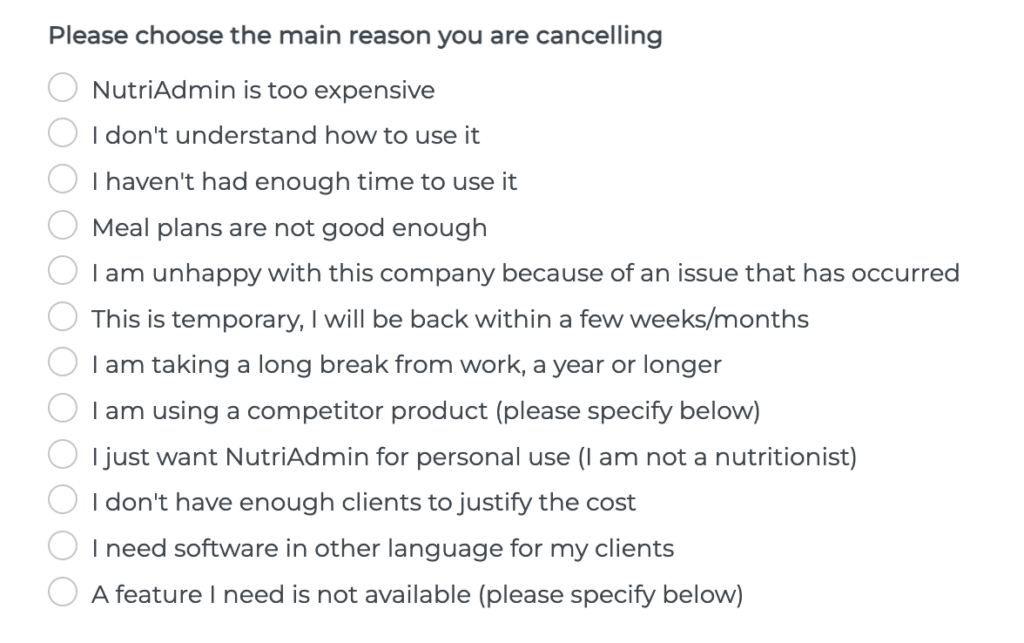
The most common cancellation reasons
The most common cancellation reasons we get are:
- Too expensive/no clients
- A key feature is missing
- Temporary/will be back
- Does not work for my region
Let’s break them down individually.
Reason 1: Too expensive/no clients
Our price range is similar to competitors, so often a user will cancel mentioning this reason when they are new to coaching and don’t have enough clients to justify the cost yet. If you are starting out, you should look for free tools or cheap plans. We have some cheap starter plans, including free, and many other apps do the same.
Reason 2: A key feature is missing
If there is a particular feature you need and we don’t have it, we won’t be able to keep you as a customer. There are a variety of apps out there, each with a particular focus and feature set. Checking the pricing page of an app is often the quickest way to check which features are included. Make sure the apps you are considering tick all the boxes on what you need.
Reason 3: Temporary/will be back
Sometimes people cancel to come back at a later time. If you work seasonally or have extended periods of time off, a consideration will be whether the software you are looking at permits pausing your membership.
Reason 4: Does not work for my region
If you need software in a particular language, or including data from a given geographical location, you should check if the app supports this. For example, at NutriAdmin, we mainly cater to customers in English-speaking countries like the USA, UK, Australia, and others. We also have users from other locations, but depending on your needs you may find a local software company is better suited.
Interpreting cancellation reasons
We do our best to address the concerns of customers canceling their subscription, and to improve the software over time. That being said, we are aware that we will never be able to provide every feature for every customer. No company can. At the end of the day, companies need to focus on a few key areas. Excelling at those in is the key to thrive. Nobody can be the best at everything all the time given how competitive the software space is.
What does this mean for you as you are trying to choose the best apps for personal trainers? You shouldn’t be afraid to test a few apps and cancel if they don’t provide what you need. Often the reaction to testing an app will be a clear YES or NO based on your experience.
We know from experience that NutriAdmin is the best for certain people. This cohort finds the app very valuable and uses it for years. On the other hand, there are others that try it and cancel quickly because it doesn’t address their needs.
An app may objectively be the biggest in a market, the oldest, or the most popular. That being said, you should be skeptical about a company claiming to be the best for everyone in every aspect. If that were too there would be no competition, which leads to the next consideration: market size.
Does size matter? Niching and differentiation
Would you rather choose an app provided by a large company or a small one? Does it matter?
Consider the largest software companies in the world: Google, Microsoft, Apple, Meta. How come they are not launching the best app for coaches? Should be trivial considering they have some of the best software engineers in the world and infinite resources.
The reality is that a market like “coaches”, in fact, most professions, is too small for a large company. The majority of the products the largest software companies provide aim at general consumers. I.e. products that anyone can use, like social media, operating systems, email, smartphones, etc.
In addition to the above, companies like Microsoft also sell to large corporations. Although the number of corporations is smaller than the number of consumers, given the size of the average deal (e.g. tens of thousands of dollars a year for cloud software for a bank), large companies find this market lucrative.
On the other hand, consider a tiny startup of 2 people. Clearly, there are limits to the kinds of products they can provide. For example, a 2-people team cannot hope to create a search engine to compete with Google. At least, not unless they receive massive investment and quickly grow their team and company size in a short period of time.
How company size affects apps for coaches and apps for personal trainers
For a coach, the takeaway is that apps for coaches or personal trainers will often be provided by relatively small companies. These smaller companies will tend to cater to this niche market. There are three cases to consider:
- Single-product companies: A small team, e.g. 1-10 employees that works solely on making an app for coaches
- Multi-product companies: A larger company, e.g. 10-1000 employees that provides a variety of offerings, including an app for coaches
- General-purpose product companies: A larger company, e.g. 10-1000 employees that provides a polished product. This product can be used by many similar professionals. E.g. app for anyone in healthcare, or anyone that needs appointments
There are advantages and disadvantages of going with any of the above company types, broken down below.
Company size comparison chart
| COMPANY TYPE | PROS | CONS |
|---|---|---|
| Single product | • High specialization. The team focuses solely on you and what you need as a coach. • You can get key features that you wouldn’t get anywhere else. This is because they are so niche. • You can have (almost) everything you need in a single app. Less need for integrations. • Premium customer support. You often can talk to the founder of the company or an expert close to the core team. | • Team has a smaller marketing budget. So you may not even hear about them in the first place! • Specialized solutions tend to be relatively more expensive. That’s because the market for the product is smaller. • Some aspects of the product (e.g. the design) may look less polished than in a larger company. It boils down to whether the team has the relevant skillset. • Fewer integrations. However, you may not need them if everything is included in a single app. |
| Multi-product | • A larger company can pool resources efficiently. E.g. a single designer can make 10 apps in the same company look great. On the other hand, a smaller company may not be able to afford that. • If a company is launching multiple products that’s often a good sign. It could indicate they have been successful and have valuable experience. • There may be more integrations with other tools within the same company, or with external tools. | • Consider if the app for coaches is or is not the main focus of the company. You may get a subpar product that doesn’t get the full attention it deserves from the core team. • Companies may abandon the product at any point if not profitable and choose to refocus their investment in their main product. E.g. Google abandoning Google+ as their social media. |
| General-purpose | • Very polished apps since a lot of resources have been sunk into developing them. Products for mass market must be spotless. • Often support many third-party integrations. If the app is big other companies will want to link to it too. • Tend to be cheaper than more specialized apps. That’s because the potential market for the product is much larger. | • You may get common features like appointments/payments. However, specialized features like exercise training or nutrition-related functionality will be near impossible to have. • Customer support is more likely to be outsourced. That being said, it depends on the company. Some larger companies still have great support. • May need to cobble together several apps for all the functionality you need. This would be negating the cost and simplicity benefits. |
The type of company you choose, how big it is, and how specialized will have implications as mentioned above. Of course, this is not a substitute for actually trialing the product, but it can be a rough indication. At the very least, you should try one product in each category. This way, you can see how the differences stack up.
How to find trustworthy reviews on the best apps for coaches
When you look for good restaurants online, Google maps or Yelp are great resources. Similarly, Amazon has good reviews for its products (though some reviews may be fake). Airbnb or Uber are great to evaluate hosts/guests and car rides. Finally, Trustpilot is another great online tool for company reviews.
What about software reviews? When it comes to apps for coaches and personal trainers, the best place to check reviews is Capterra. Nothing else comes close.
Wait, I never heard of Capterra?
Now, you may be thinking, I have not heard about Capterra before. How can this be a good place for reviews? That’s a reasonable question. Consider that Capterra specializes in reviews for commercial software (e.g. software for work, like coaching). Moreover, the typical professional doesn’t shop for software like this very often. It follows that it’s understandable that you wouldn’t have heard of it before.
You have gone to restaurants thousands of times, but how often do you change your main apps for work? Most people hardly ever change the apps they use for coaching. That’s why you may not have heard of Capterra – they are a specialized reviews site. It’s the same reason most people don’t know about swimming pool installation companies until they need to install one!
If you don’t believe me, then all you have to do is google “nutritionist software reviews” or “coaching app reviews”. One of the top results will either be Capterra, or GetApp/SoftwareAdvice. These two additional sites are both owned by Gartner media which is the same company that owns Capterra. You may also find G2Sell, which is a competitor to Capterra with similar reviews. Capterra is the biggest and most reliable in my opinion. You are, of course, encouraged to do your own research.
Why is Capterra a good source of software reviews?
What makes Capterra and similar websites great for software reviews? Check the list below:
- Only users can submit reviews. The team at Capterra will ask for screenshots to prove you are logged in to the app, so all reviews are from actual users of the software.
- Identity verification. A dedicated team will check that the person submitting the review is an actual human, checking ID, registered company, social media profiles, and other data. In case identity cannot be verified the review won’t be published. This means virtually no fake reviews.
- Ability to compare apps: You can compare similar apps by price, features, language, platform, and other useful filters. E.g. see side-by-side all Android apps in English for coaching including calorie tracking.
- Structured reviews: There is a structure in each review which encourages evaluating how easy it is to learn/use, what are the pros/cons of the software, value for money, and likelihood to recommend to a friend.
- Reviews include customer support: Given that every company out there will claim to have “the best customer support ever”, it is good to check an actual unbiased collection of reviews from users to see which companies are actually telling the truth.
Alternative options
Here at NutriAdmin we have checked all the different reviews sites available for our own users to review our software. Over the years we have found that Capterra was the best and most useful. This is because reviews are guaranteed to be verified. Moreover, prospective users can filter and find exactly what they care about.
How does Capterra make money?
You may be thinking, how does a company like Capterra make money?
It’s always good to ask about where the money is coming from. After all, if they have teams of people maintaining listings and verifying reviews that is costly. It’s good to understand how they monetize their reviews. This knowledge can help you be more critical of the information you see online. It can help you know the agenda of a company.
For instance, Google makes most of their money from search ads. That’s why they always place promoted results at the top of search. Every time you click on one of those links Google makes money. Their whole empire is built on these ads and others, that represent 90%+ of their profits.
Similarly, the way Capterra and others monetize reviews is by charging companies to appear at the top of the list. When you check reviews, you probably want to change the default sorting to avoid being misled. You can sort by highest reviews, rather than sort by “promoted” as shown below.
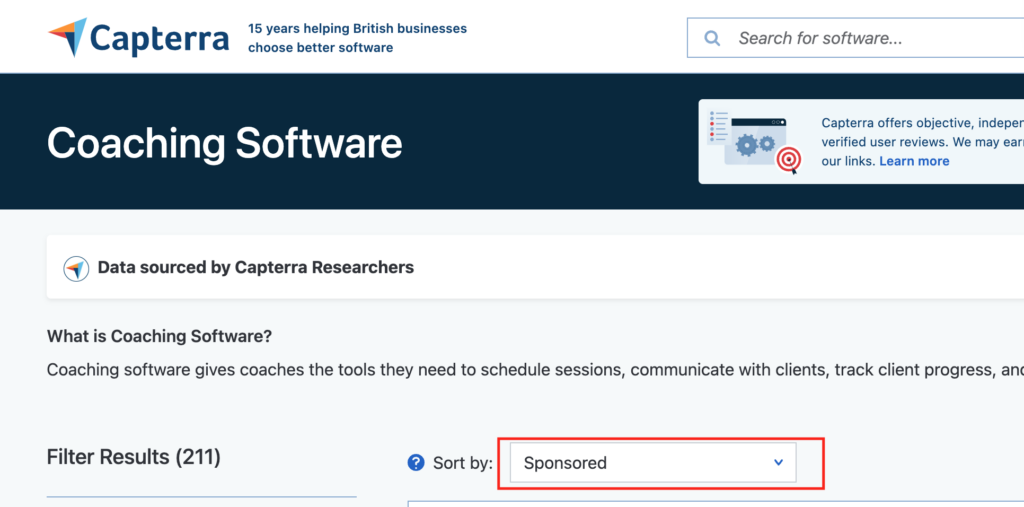
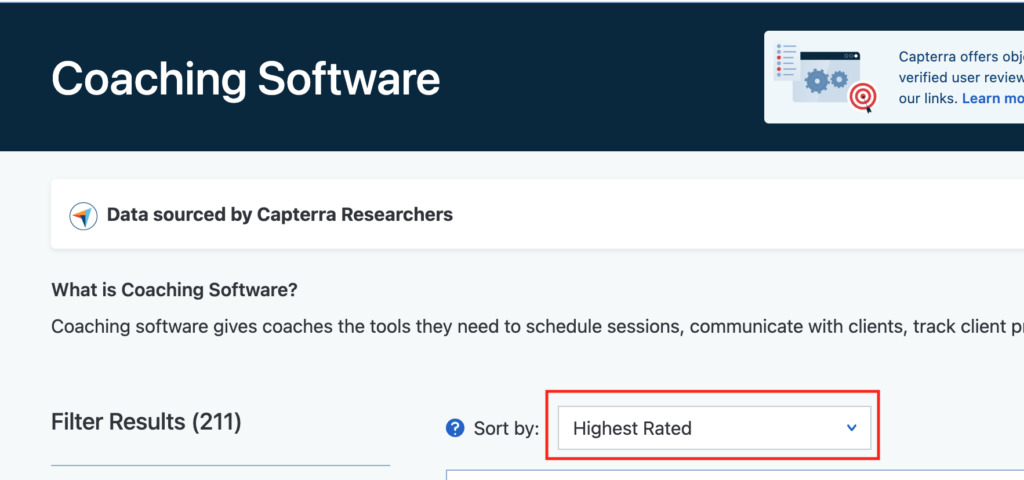
How to evaluate reviews for competing apps for coaches?
Here at NutriAdmin we have competitors like any other business. Talking about your competitors is a bit of a taboo amongst businesses, but these fears are – in my opinion – ridiculous. After all, anyone with internet access will be able to Google your competitors in 5 seconds!
If you check nutritionist software reviews or coaching software reviews, you will find dozens (sometimes even hundreds) of options. NutriAdmin is just one app amongst many others. With 200+ apps for coaches listed, anyone claiming to be “the best for everyone” is clearly delusional. The list for the best apps for personal trainers is huge too. There are at least dozens of apps with excellent reviews in each category. This means dozens of apps have sufficient “happy customers” to be great for a certain segment. For this reason, it is worth it to try a few options and see what works best for you personally.
Now, the above being said, you don’t have to consider hundreds of apps. That would be overwhelming. The good news is that you can check a much smaller number.
Start by discarding unsuitable apps from the list
You can start by discarding the any apps ticking any of these boxes:
- Have been around for a short time, like 1 year or less
- No reviews
- Too few reviews
- Low reviews
- Apps that don’t offer key features you need
- Price range outside your budget
- Platform you don’t have access to (e.g. apps exclusively for Windows when you use Mac)
Clearly, an app meeting any of the above criteria won’t be a good match. Feel free to expand your list for anything that is crucial to you. I.e. If you need your app to be HIPAA-compliant, that is a must have requirement. You shouldn’t waste any time on apps that don’t meet that necessary criterion.
Eliminating overly-generic apps from the list
After you discard the obvious apps by the criteria above, the list will shrink significantly. Now, there is another crucial step so that you don’t waste your time. Consider if the big apps offer what you need.
Invariably, when you check reviews sites like Capterra, some of the apps at the very top will be larger companies. This is because those companies have the budget to get thousands and thousands of reviews. Sometimes these reviews will have been paid for. This means the app paid their own users to provide a review. Anyone with a million dollars to spend on reviews can get thousands.
Now, an app paying for reviews isn’t necessarily a bad thing. After all, the app cannot influence if the reviews will be good or bad – at least not in Capterra. Having thousands of reviews indicates that the app is provided by a larger company (check above). A larger company has some pros and some cons.
Example of a generic vs specialized app in the reviews list
For example, when you check software for nutritionist reviews, one of the top results is “Acuity Scheduling”. This particular company has 5,500+ reviews at the time of writing. Although this is a popular and highly rated app, it focuses on “scheduling” as their name indicates.
On the other hand, an app like NutriAdmin also offers scheduling (probably not as good as Acuity’s since they have more resources). However, we also have meal planning, recipes, and other nutrition specific features. A general-purpose app for a wider market cannot focus on such niche features. That is because only 1% of their users would want those features.
Heck, if all you need is scheduling you may do well with Google Calendar for free! Google has so much money they can have hundreds of developers perfecting a calendar and give it away for free. But then again, such a large company won’t find a niche market like coaches profitable enough. This includes specific features like exercise tracking, nutrition analysis, or fitness goal management.
Biased vs unbiased information
Final comment on biased vs unbiased information. As I’ve mentioned above, my company is NutriAdmin. This means anything I say about my own app is going to be biased. I.e. I have an interest in readers buying my products if they are the right fit for them.
Similarly, any other company website is going to be biased too. After all, the purpose of marketing is to nudge prospective buyers into customers. The language websites use will be as persuasive as possible to accomplish this goal. Different companies have different positioning, and some may be better than others, but everyone is biased for obvious reasons.
For the above reasons, you have to be critical when you check information provided by anyone on their website. This includes even this article! You should always bear in mind the agenda of the author is to sell their product.
Despite the bias, some information will be useful and irreplaceable. For example, there will be objective information that you can read about. This includes pricing, features list, the size of the company, etc. This information will be most up-to-date on a company’s website.
Unbiased information can be used to verify claims
Unbiased information will come from independent reviews and from the comments of users. After all, a user doesn’t have an incentive to sell you the app they use (unless they are an affiliate and make a commission). If anything, a successful coach may not want their competitors to use a great app they have discovered themselves.
Reviews can serve to verify company claims with unbiased opinions from real users. Reviews will tell you if the claims a company is making are true or not.
How to choose the best apps for coaches and personal trainers
Armed with all the information above now you know everything you need to know to pick the best apps for coaches. Likewise if you are a PT looking for the best apps for personal trainers. Here comes a simple process that you can use to pick the app you think is best for you.
Making a shortlist
Start by making a shortlist of the apps that look best based on all the criteria above. Include here apps with any of the following characteristics:
- Good reviews
- App shows high on Google when you search for “software for health coaches” or “fitness coaching software”, or similar
- You have heard good things about the app (e.g. from colleagues or trustworthy sources)
- Apps you simply are curious about and want to try out
You should discard any apps from the list as mentioned above. E.g. apps outside your budget, or not offering key features you need.
Making the most of free trials for coaching apps
The vast majority of apps for coaches and apps for personal trainers will offer a free trial. This is so that you can check the app on your own prior to making a buying decision. This is the best way for you to evaluate if the software is right for you. For example, we offer a 14-day free trial for NutriAdmin at our company that anyone can sign up for.
My recommendation is that you use the free trial to evaluate the following:
- How responsive is the team when I ask a question, and how helpful?
- Do I like the software or app when I use it?
- Is it easy to use?
- Does it offer the features I am looking for?
What if there is no free trial option?
These days virtually all software companies provide free trials. Even if a company doesn’t want to do this, they will be pressured by the competition. That is unless they are happy losing loads of customers to competitors that do offer trials.
If you encounter a product that you cannot try for free, then that is a red flag. One option is that this is an old product, a decade at least, that hasn’t been updated. Another option – in my opinion – is that this is a company trying to bank on customer ignorance. You don’t want to be locked into a company like that. How can you trust someone that asks for money before you see what you are actually buying?
What about credit card requirements for free trials?
Some companies will ask you for a credit card in order to use their trial whilst others won’t. It comes down to trade-offs.
If a company doesn’t ask for credit cards they will get more trials. Simple as that. However, these trials will be less intentional on average. I.e. users that never intend to buy. Even worse, many users will be hackers, or bots, or people intending to exploit the software.
On the other hand, when asking for a card upfront a company can filter out a lot of threats. These include the aforementioned bots and hackers. It also makes it easier for the company to prevent abuse. One example is to prevent users signing up for 50 free trials with 50 different email addresses.
NutriAdmin’s case study on card requirement for trial
In NutriAdmin, we have tried both options: asking for a card for a trial and not asking. Based on the data, we have decided to ask for a card upfront. Our results indicate that this way we can:
- Give more attention to users trialing the software that are more likely to become customers
- Prevent bots and hackers from signing up
- Prevent abusive behavior, like signing up for 50 free trials
We will send a reminder to every new user before their trial ends. In addition, we also offer a refunds policy or money-back guarantee. Our policy is to always refund someone who got charged for a trial they intended to cancel. Some conditions apply, such as reporting this within a reasonable timeframe. You should always check the conditions on products you are trying. Things to check include:
- Is there a refunds policy?
- Will I be reminded before the trial ends? You should set your own reminders just in case
- Is there a money-back guarantee?
- How long is the trial?
Please be diligent, especially if you try multiple apps. You don’t want to make a mistake and lose money on a product you won’t use.
Use the trial to do a sample of your usual work
The best way to evaluate the software is to attempt to do some sample work. For example, try creating a sample meal plan, or scheduling some coaching sessions. You can test this out with a “mock client” (e.g. a client with your own email and details). This way, you can see how the app would work in a typical scenario.
For example, in NutriAdmin, you can create a mock client with your own email. Once that’s done, you can send an appointment booking email there. Following that, you can fill in a sample nutrition intake questionnaire, then take some sample notes in that client record. Finally, you can finish by creating some reports and meal plans for that client.
When evaluating the software in this way you can see how well it adapts to your natural workflows. You should ask yourself, does this app provide value? E.g. Does the software save you time? Or does it enable you to open new avenues for income?
Finally, how reliable is the software? Do you encounter technical problems like bugs? How useful is the support team? Do you encounter any unexpected issues? How fast are they resolved?
When you are done evaluating the trial for a software don’t forget to cancel your free trial. Obviously, you want to avoid being charged. This can slip if you are trying multiple options.
Evaluating pricing for apps for coaches and personal trainers
Once you have tried a few apps, you will likely have one or more favorites. You may want to evaluate the cost to pick the one that is best for you.
If you encounter an app that delivers more value than it costs then that’s a good choice already. E.g. Consider an app that saves you about 50 hours of work a month. If one hour of your time is worth $10, then that app is saving you $500/month. It follows that if it costs $50/mo then that’s a good deal!
Obviously, apps can also create new work you didn’t have to do before, like extra admin work. One advantage of web-apps is that you don’t have to worry about updates, which are a pain. This is as opposed to apps you download and install on your computer. These days, most apps for coaches and personal trainers will be online web-apps or smartphone apps, but still worth mentioning. Smartphone apps require updates, but the process is not as painful as with desktop apps.
Don’t settle for an app if you find it takes you more time to do your work than before. I mean, be a bit patient, as with some apps it may take a few days of practice to get good at them. But, what if after a few days, you still find an app is too convoluted? Then it’s probably time to ditch that app.
Comparing similarly-priced apps
When it comes to comparing pricing, if you have 2 or more apps you really like, you may be tempted to just go with the cheapest. Due to competition, most apps that offer similar features will have similar prices. If the differences are small then it’s probably best to do some more testing. This is to see which apps bring more value. If an app costs a few dollars more, but may lead you to get an extra client per month, then that’s probably a better choice! Of course it all depends on your personal circumstances.
Just take into account that an app for coaching will likely be a long-term commitment. It may be hard or near-impossible to switch from one app to another after years of accumulating data. For this reason, you want an app that is likely to be around in the future. You also want an app that offers the ability to export your data. Finally, the app should have a pricing structure that makes sense for your circumstances.
Should I use one or multiple apps for coaches?
Everybody needs scheduling, payments, and client communication. Those are the most basic features that every app should provide. You can use separate apps for that, then specialized coaching apps for other aspects.
For example, at NutriAdmin, some of our customers use Zoom or Skype to make client calls. This is despite the fact we offer our own telehealth feature. Likewise, some of our users use a payment gateway to handle payments. Finally, some opt for Google calendar for appointments, or messaging apps for communication.
On the other hand, some of our users do all their work within NutriAdmin. These users prefer communicating with clients via the client portal, and handling scheduling all within the app. Our CRM for coaches is also a key feature.
Comparing using one vs multiple apps
Using one or multiple apps has some pros and cons, broken down below
| SOLUTION | PROS | CONS |
|---|---|---|
| All-in-one app | • All data is synced and in one place. Much less need for integrations. Lower maintenance. • Features talk to each other. E.g. a client booking an appointment is automatically registered in the system. • Probably cheaper than buying many separate apps. This is even if you don’t use all the features available. | • The “common features” that have a wide market, e.g. scheduling, payments, or videoconferencing may not be as polished as with a general-purpose app. That’s because the larger, general-purpose apps will have far more resources to invest. |
| Multiple apps | • Specialized apps – an app that just does “scheduling” and “appointments” is likely to be very good at that function. Mass market apps rely on solutions that work for a wide market. • Better individual tools – one app for each key function you need. E.g. one for meal planning, and one for scheduling. This can get you the best of both worlds. | • App integrations may not be complete enough to enable all your workflows. E.g. some key data is not synced between apps. • Prices likely to add up if you have to pay for multiple apps. May not be worth the investment. |
Customer support evaluation
In an ideal world you wouldn’t need to reach out to customer support. Everything would be extremely intuitive and the software or apps you use would simply work without a hitch.
Unfortunately, the way software is developed these days, issues can happen with an app. From a feature not working as expected, to mysterious error messages, to human error like accidentally deleting important data.
Having the ability to reach out to a competent human that can answer your questions and provide technical support is invaluable. After all, what is the point of great software if you get stuck and cannot get help?
You should use the free trial period and feedback from user reviews to evaluate the quality of the customer support you receive throughout the process. Companies tend to be quite consistent when it comes to customer support. Often it is either great or awful, and this doesn’t tend to change too much over the years.
Customer support is not just there for addressing issues though. Another key consideration is “how easy is it to learn to use the app?”. The best software companies will provide intuitive design and easy-to-follow video or text tutorials. In some cases, you may even receive a course, a one-on-one call, or webinars to educate you as a user.
Free resources to help you choose the best apps as a coach
We have discussed a variety of ideas and considerations so far. To help you organize these ideas, and to put them into action, you can download the checklist below. Additionally, you can check out this free video discussing the topics in this article.
Watch the video
Both the video and article have been made by the same person (Diego). If you are curious to hear what I have to say in person, please check the video below.
Checklist for choosing the best apps for coaches
I have put together a simple checklist you can download including all the tips from this article in one place. You can download it and use it to evaluate which apps are best for your use-case.
So what are the best apps for personal trainers and coaches?
In conclusion, there is no overall top app for coaches out there. It all depends on your circumstances, preferences, budget, and a host of other factors. Besides, if there was such a perfect app out there you wouldn’t want to hear it from me. This is, of course, since I am biased as the co-founder of NutriAdmin.
You may find “rankings” or “lists” of best apps for coaches out there. Same goes for the best apps for personal trainers. However, these should be treated with a pinch of salt. Have the authors of those lists done some objective research to pick the best apps? Or are they just capitalizing on website clicks to drive traffic to their website? Are they biased and promoting sponsored apps? You should be critical to avoid being misled.
What I hope to have provided with this article is a guide on how to choose the best coaching apps. Specifically, for your fitness/wellness coaching career. This can be a single app, or multiple depending on your circumstances. I have focused on the aspects of the purchase decision that you may not be aware of. This comes from my experience running a relevant software business. Topics have included, where to get reliable reviews, how to differentiate between biased/unbiased information, etc.
Get started today!
Now comes the real work. You should take this advice, and combine it with other trustworthy advice from other sources. Don’t just do what I say, I am just one person, I could be wrong. It’s always best to merge information from many sources, then make up your own mind. The key is to use your judgment to pick the best app for your work.
Don’t feel pressured to haphazardly pick one app and stick with it forever. Please take the time to become educated on what apps are on offer. Take time to test them, learn what is mediocre and what is exceptional. Only when you are ready can you ultimately make the most informed decision you can. A great coaching app will make you effective at work for years and years.
You may be using the same app for many years. We launched NutriAdmin back in 2016 and we still have some loyal users from the first couple of years. These users have mostly used the app non-stop since then. Any good app will have some loyal customers. Just think that if you are going to use the same app for 10 years or more it’s probably a good idea to at least spend a few days today choosing to ensure you make the right choice.
Parting thoughts
I won’t be providing any specific app recommendations as I haven’t tried them all. After all, I am not a coach, plus I am biased towards my own app. You can check top reviews sites, friend recommendations, search on Google, and Youtube. Alternatively, you can check out our NutriAdmin alternatives and comparisons page for some ideas on the available coaching apps, along with a summary of their features, pricing, free trials, and more. Use any suitable channels to make your shortlist.
I hope you have found this article useful and I am happy to answer any questions in the comments below. If you want to reach out to me directly you can check out nutriadmin.com. This is for more information about our software or to ask me anything about this article.
Hope you find a useful app that helps you improve the lives of as many clients as possible!
